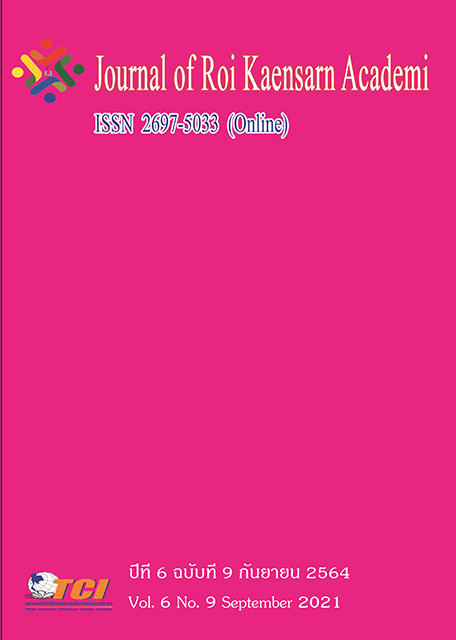รูปแบบการทำเกษตรเชิงพุทธของชาวสวนในอำเภอเมือง จังหวัดมหาสารคาม
Main Article Content
บทคัดย่อ
งานวิจัยนี้มีวัตถุประสงค์ 1) เพื่อศึกษาการทำเกษตรเชิงพุทธในพระพุทธศาสนาเถรวาท 2) เพื่อศึกษาสภาพปัญหาของการทำเกษตรของชาวสวนในอำเภอเมือง จังหวัดมหาสารคาม 3) เพื่อเสนอรูปแบบการทำเกษตรเชิงพุทธของชาวสวนในอำเภอเมือง จังหวัดมหาสารคาม เป็นงานวิจัยเชิงคุณภาพซึ่งได้ศึกษาค้นคว้าข้อมูลทางด้านเอกสารและการเก็บข้อมูลจากการสัมภาษณ์เชิงลึก แล้ววิเคราะห์ข้อมูลแบบวิธีพรรณนาตามหลักอุปนัยวิธี
ผลการวิจัยพบว่า
1. การทำเกษตรเชิงพุทธในพระพุทธศาสนาเถรวาท เป็นการทำเกษตรที่ตั้งมั่นอยู่ในความถูกต้องดีงามสามารถพึ่งพาตนเองได้ ช่วยเหลือสังคมได้ โดยยึดหลักธรรมสัมมาอาชีวะ อิทธิบาท 4 สังคหวัตถุ 4 พรหมวิหาร 4 และศีล 5 ในการเกษตร
2. สภาพปัญหาการทำเกษตรของชาวสวนในอำเภอเมือง จังหวัดมหาสารคาม มี 6 ข้อ คือ 1) ชาวสวนขาดองค์ความรู้ในเรื่องของการใช้สารเคมี ขาดการส่งเสริมจากภาครัฐ 2) สภาพแวดล้อมในการทำเกษตรขาดความอุดมสมบูรณ์ 3) น้ำในการทำเกษตรมีสารเคมีเจือปน สร้างมลภาวะก่อเกิดมลพิษต่อสิ่งแวดล้อม ไม่พอเพียงในฤดูแล้ง 4) ดินขาดแร่ธาตุ เสื่อมโทรมเสื่อมสภาพ ส่งผลต่อการเจริญเติบโตของพืช 5) ต้นทุนสูง ผลผลิตต่ำ 6) มีศัตรูพืชมาก
3. รูปแบบการทำเกษตรเชิงพุทธของชาวสวนในอำเภอเมือง จังหวัดมหาสารคาม เป็นรูปแบบการทำเกษตรอินทรีย์ เกษตรชีวะภาพ และเกษตรจุลินทรีย์สมุนไพรสูตรครูน้ำมวก ซึ่งเป็นนวัตกรรมใหม่ เพื่อแก้ไขปัญหาการลดงดใช้สารเคมี ไม่ทำลายสิ่งมีชีวิต และเป็นมิตรกับสิ่งแวดล้อม ลดศัตรูพืช ลดต้นทุน เพิ่มผลผลิต ปลอดภัยต่อผู้ผลิตและผู้บริโภค เป็นไปตามหลักสัมมาอาชีวะ อิทธิบาท 4 สังคหวัตถุ 4 พรหมวิหาร 4 และศีล 5 สอดคล้องกับหลักเศรฐกิจพอเพียงของในหลวงรัชกาลที่ 9
Article Details
เอกสารอ้างอิง
พระเทพรัตนมุนี (สายพงศ์ อโนมปญฺโญ). (2556). “การเกษตรแนวพุทธเพื่อแก้ปัญหาเศรษฐกิจชุมชน”. ดุษฎีนิพธ์พุทธศาสตรดุษฏีบัณฑิต. บัณฑิตวิทยาลัย: มหาวิทยาลัยมหาจุฬาลงกรณราชวิทยาลัย.
สุพรรณ เฟื่องบุญ. (2545). “การพัฒนาสื่อประสม เรื่อง เกษตรทฤษฎีใหม่ตามแนวพระราชดำริ ร.9 ผ่านระบบเครือข่าย”. การศึกษาค้นคว้าอิสระปริญญาการศึกษามหาบัณฑิต สาขาเทคโนโลยีการศึกษา. บัณฑิตวิทยาลัย: มหาวิทยาลัยมหาสารคาม.

